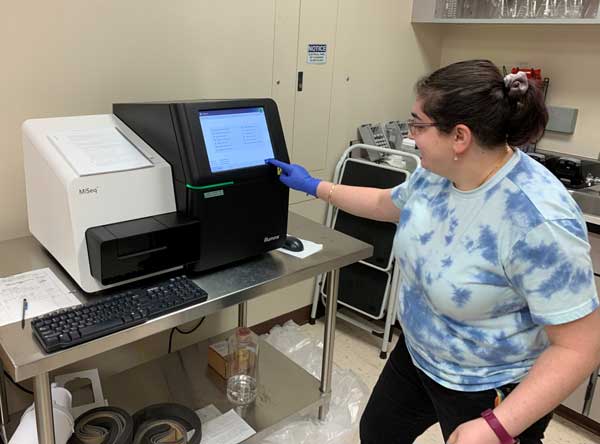Grant: 21-024R
Project Title: Molecular Identification of Sea Turtle Diet Items using Colon Swab DNA
Project Manager: Erin E. Seney, Ph.D.
Organization: University of Central Florida (Research and Educational Institute)
Grant Amount: $14,274.00
Completion Date: 2023-10-16
Summary: The diet of an organism provides valuable information on its habitat, ecosystem role, and potential for interaction or competition with human activities. Diet characterization can be conducted using a variety of approaches, including direct or camera-based observation of foraging, visual analysis of gut content, lavage, or fecal samples, DNA sequencing, stable isotope analysis, and fatty acid profiling. University of Central Florida (UCF) researchers have recently developed a protocol for molecular identification (DNA metabarcoding) of green turtle diet items as part of a broader sea turtle diet characterization project. In this project, we will leverage a large number of existing DNA samples, previously extracted from sea turtle colon swabs for a microbiome project, for: (1) high-resolution characterization of green sea turtle diet throughout Florida during 2016-2019; (2) comparison of diet metabarcoding data to already-completed fine-scale visual analysis results for Florida loggerhead and Kemp’s ridley gut content samples from 2015-2019; and (3) generation of recommendations for use of single swab samples for both microbiome and diet characterization in three sea turtle species. Conservation, management, and recovery of these protected species will be enhanced through a better understanding of their diet and related habitat requirements, both through results of the proposed study and from potentially expanded diet sampling methods. Results: Overlapping with the beginning of this project, Dr. Forsman and her team conducted in-depth analyses of multiple primers for a foundational sea turtle diet metabarcoding project, which was recently published (Sarkis et al. 2022, https://doi.org/10.1093/icb/icac080). Based on the prior STGP-funded study (17-017R), we selected primers targeting the CO1 gene and the V4 region of the 18S gene for diet metabarcoding of colon swab DNA for this project. A team lead by former undergraduate researcher Chris Sarkis and collaborator Dr. Brandon Hoenig (U. Pittsburgh) “trained” taxonomic classifiers for sea turtle diet to complete faster taxonomic assignments from CO1 and 18SV4 sequencing data. We have completed amplification extracted colon swab DNA for diet characterization for both primers (PCR-1) for all samples and preparation of molecular libraries (PCR-2) were completed in Fall 2022-Spring 2023. Sequencing of for CO1 was completed the UCF Illumina MiSeq machine in early 2023 and for 18SV4 in May 2023. Previously, DNA extractions and library preparation was delayed due to personnel injury and Hurricane Ian, and we were further delayed by leaks in our building’s boiler system that impacted computers and some unexpected issues with the Illumina MiSeq machine that required service. The trained classifiers were used in early 2023 for food item identifications for CO1. Classifiers are being revised for use to conduct additional (complementary) food item identifications with in-hand for 18SV4. This study validates that DNA extracted from colon swab samples can be reliably used to characterize the diets of three sea turtle species across a wide breadth of diet taxa, as well as parasites. The results emphasize the utility of DNA metabarcoding for identifying otherwise undetected diet species, including gelatinous prey for all three sea turtle species and an unexpectedly high occurrence of bony fishes in green turtles (which are typically observed very rarely consuming fishes compared to loggerheads and Kemp’s ridleys). Results further support previously conclusions (e.g., Sarkis et al. 2022) that Florida’s green turtles are (or have become) more omnivorous than previously thought.
Results: Overlapping with the beginning of this project, Dr. Forsman and her team conducted in-depth analyses of multiple primers for a foundational sea turtle diet metabarcoding project, which was recently published (Sarkis et al. 2022, https://doi.org/10.1093/icb/icac080). Based on the prior STGP-funded study (17-017R), we selected primers targeting the CO1 gene and the V4 region of the 18S gene for diet metabarcoding of colon swab DNA for this project. A team lead by former undergraduate researcher Chris Sarkis and collaborator Dr. Brandon Hoenig (U. Pittsburgh) “trained” taxonomic classifiers for sea turtle diet to complete faster taxonomic assignments from CO1 and 18SV4 sequencing data. We have completed amplification extracted colon swab DNA for diet characterization for both primers (PCR-1) for all samples and preparation of molecular libraries (PCR-2) were completed in Fall 2022-Spring 2023. Sequencing of for CO1 was completed the UCF Illumina MiSeq machine in early 2023 and for 18SV4 in May 2023. Previously, DNA extractions and library preparation was delayed due to personnel injury and Hurricane Ian, and we were further delayed by leaks in our building’s boiler system that impacted computers and some unexpected issues with the Illumina MiSeq machine that required service. The trained classifiers were used in early 2023 for food item identifications for CO1. Classifiers are being revised for use to conduct additional (complementary) food item identifications with in-hand for 18SV4. This study validates that DNA extracted from colon swab samples can be reliably used to characterize the diets of three sea turtle species across a wide breadth of diet taxa, as well as parasites. The results emphasize the utility of DNA metabarcoding for identifying otherwise undetected diet species, including gelatinous prey for all three sea turtle species and an unexpectedly high occurrence of bony fishes in green turtles (which are typically observed very rarely consuming fishes compared to loggerheads and Kemp’s ridleys). Results further support previously conclusions (e.g., Sarkis et al. 2022) that Florida’s green turtles are (or have become) more omnivorous than previously thought.